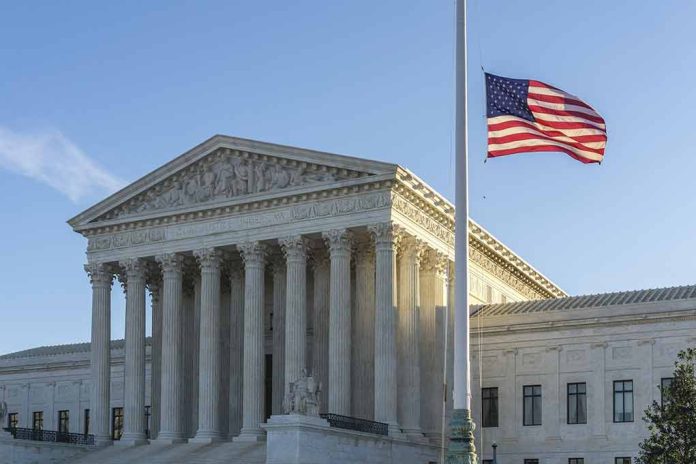
The Supreme Court’s 7-2 decision upholding Biden administration restrictions on ghost guns marks a significant victory for gun control advocates while raising concerns among Second Amendment supporters about regulatory overreach.
Key Takeaways
- The Supreme Court upheld Biden-era regulations requiring serial numbers and background checks for ghost gun kits in a 7-2 decision with Justices Alito and Thomas dissenting.
- Ghost guns, which are privately made firearms without serial numbers, have increased dramatically at crime scenes – from fewer than 1,700 in 2017 to over 27,000 in 2023.
- Since implementation of the regulation, ghost gun recoveries have stabilized or declined in major cities like New York, Los Angeles, Philadelphia, and Baltimore.
- The Bureau of Alcohol, Tobacco, Firearms and Explosives (ATF) now classifies ghost gun kits as firearms under the 1968 Gun Control Act, requiring serial numbers and background checks.
- Gun advocacy groups challenged the regulation, arguing the ATF exceeded its authority by expanding the definition of “firearms” to include kits and parts.
Supreme Court Delivers Major Ruling on Untraceable Firearms
In a decisive 7-2 ruling, the Supreme Court upheld a Biden administration regulation requiring ghost guns to carry serial numbers and mandating background checks for their purchase. The regulation, implemented by the Bureau of Alcohol, Tobacco, Firearms and Explosives (ATF) in 2022, classifies ghost gun kits as firearms under the 1968 Gun Control Act. Justice Neil Gorsuch authored the majority opinion, while Justices Samuel Alito and Clarence Thomas dissented from the decision, highlighting significant conservative division on the interpretation of existing gun laws.
Ghost guns have emerged as a growing concern for law enforcement agencies across the country. These weapons, which can be purchased online without background checks and lack serial numbers, are virtually untraceable when recovered at crime scenes. Prior to regulation, users could anonymously purchase these kits online, often using cryptocurrency or pre-paid debit cards to maintain anonymity. The components could then be assembled into fully functional firearms in as little as 30 minutes, effectively circumventing traditional firearm purchase regulations.
The Supreme Court upholds the ATF’s rule from the Biden administration restricting ghost guns.
Ruling was 7-2 with Neil Gorsuch delivering the opinion. Alito and Thomas dissent. pic.twitter.com/erregtvDJX
— Politics & Poll Tracker 📡 (@PollTracker2024) March 26, 2025
Legal Challenges and Regulatory Authority
The core legal dispute centered on whether ghost gun kits meet the definition of a “firearm” under existing law. The 1968 Gun Control Act defines a firearm as any weapon that can be “readily converted” into a functional firearm. The government successfully argued that kits allowing assembly into working firearms within approximately 30 minutes satisfy this definition. Kit sellers challenged this interpretation, maintaining that a collection of parts cannot be classified as a weapon under the law’s original intent.
The legal battle initially appeared to favor gun rights advocates when the conservative 5th Circuit Court of Appeals in Louisiana struck down the ATF rule. However, the Supreme Court’s decision reverses that ruling, allowing the federal government to regulate ghost guns under existing firearm laws. This represents a significant win for the Biden administration’s approach to gun control through regulatory action rather than new legislation, which would face considerable resistance in Congress.
Impact on Crime and Public Safety
Law enforcement officials have pointed to alarming statistics showing the proliferation of ghost guns at crime scenes nationwide. Records indicate that ghost guns recovered at crime scenes increased dramatically from fewer than 1,700 in 2017 to more than 27,000 in 2023. This rapid growth prompted the Biden administration to target these weapons through regulatory action. Since the implementation of the regulation, authorities have reported that ghost gun recoveries have stabilized or declined in major metropolitan areas including New York, Los Angeles, Philadelphia, and Baltimore.
The Supreme Court’s ruling comes in contrast to its recent decision striking down a Trump administration regulation banning bump stocks, devices that allow semi-automatic weapons to fire more rapidly. This apparent inconsistency in regulatory authority has raised questions among legal analysts about the court’s approach to executive branch rule-making on firearms. The decisions indicate that even with a conservative majority, the court remains willing to uphold certain firearm regulations when they interpret existing laws as providing sufficient authority.
Sources:
US Supreme Court upholds federal ‘ghost guns’ restrictions
Supreme Court upholds a Biden-era rule regulating ghost guns
Supreme Court upholds Biden rule requiring serial numbers and background checks for ghost guns







